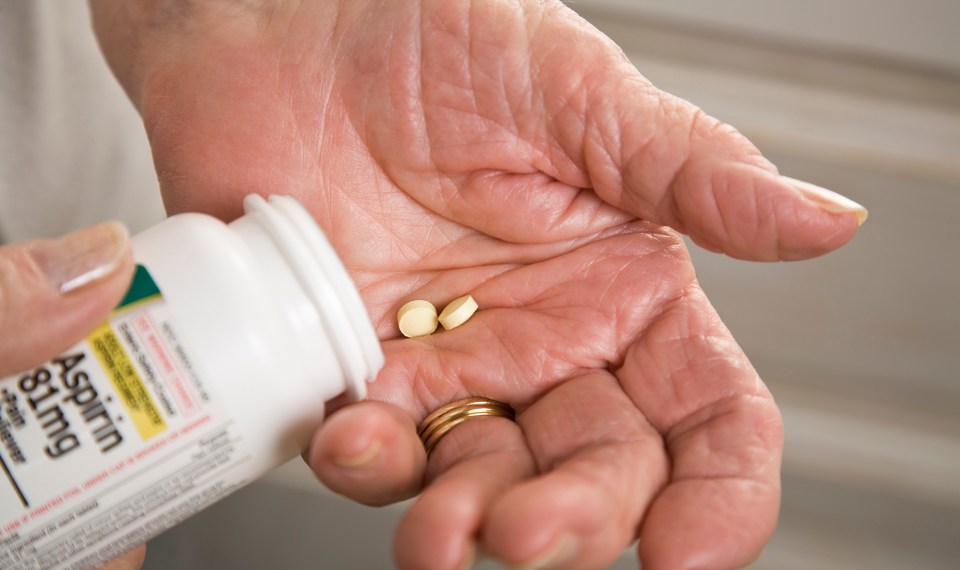Almost everyone is familiar with aspirin. In fact, aspirin is one of the first commonly used drugs. The herbal properties of aspirin (acetylsalicylic acid) date back to ancient times. Aspirin even has its own foundation. The International Aspirin Foundation was founded in 1974 to increase knowledge, understanding and medical interest in the drug. According to the Foundation, the compound was first registered as Aspirin in 1899. The inexpensive medication has long been touted for its ability to reduce fever, joint pain and inflammation. Aspirin therapy can also play an important role in stroke prevention.
Starting in the 1950s, medical researchers began to look at aspirin’s potential in preventing vascular events. Over the next few decades, numerous studies showed aspirin to be beneficial in treating cardiovascular disease. Doctors began recommending daily aspirin for the prevention of strokes and heart attacks. Aspirin became a common preventive treatment, but in recent years, some studies suggested daily aspirin might not be right for the general population.
Aspirin Therapy for Primary Stroke
While a select group of patients may benefit from taking a daily low-dose, or baby aspirin, you should never start aspirin therapy unless prescribed by your doctor.
In 2022, a U.S. Preventive Services Task Force released an updated recommendation stating that if you are 60 or older, you should not begin taking daily aspirin to prevent a first-time (primary) stroke or heart attack. In addition, they suggested if you are between the ages of 40-59 and at higher risk for cardiovascular disease, aspirin therapy should only be initiated if your doctor determines the benefits of the drug outweigh the risks.
Since aspirin is so familiar, it may seem harmless, but like all drugs, it does have side effects. Aspirin thins the blood, increasing the risk of gastrointestinal bleeding, bleeding in the brain and kidney failure. While the chance of internal bleeding is low, aspirin is no longer recommended if you have no history of stroke and do not fall into the high-risk category.
Daily aspirin is also not recommended in the following cases:
- If you have an allergy to aspirin
- If you have a history of gastrointestinal bleeding
- When you have a health condition that increases your risk of bleeding
- If you have been diagnosed with a clotting disorder
- If you drink alcohol regularly, since drinking can increase your risk of a stomach bleed
- When you are taking other medications, herbals or dietary supplements that don’t mix well with aspirin
Secondary Stroke Prevention and Aspirin
Aspirin is an important therapy for prevention of secondary stroke in patients who have suffered a previous stroke caused by blood clot. It is important to note that there are two distinct kinds of stroke. Ischemic stroke occurs when a blood clot blocks or reduces blood flow to an artery that carries blood to the brain. Most strokes – 87% – are ischemic. The drug can be helpful if taken within 48 hours of an ischemic stroke. Daily aspirin is also a commonly prescribed therapy after a heart attack or stroke. If you have a history of previous ischemic stroke, numerous studies have shown aspirin can be beneficial in preventing a second one. The effectiveness of aspirin therapy in these cases is thought to outweigh the small risk of bleeding associated with the drug.
The second type of stoke is hemorrhagic. Hemorrhagic stroke is caused by a weakened blood vessel in the brain that ruptures and bleeds. Aspirin is not recommended for hemorrhagic stroke because it could worsen the bleeding. Because the type of stroke cannot be determined without medical testing, such as a CT scan, it is not recommended you take aspirin during a stroke. After medical evaluation, your doctor will advise whether aspirin therapy is right for you.
Aspirin Use in Cardiovascular Conditions
Daily aspirin or low-dose aspirin may be prescribed if you have angina, have undergone bypass surgery, have a cardiac stent or have poor blood flow to the brain. It may also be prescribed if you have diabetes, along with a risk factor for heart disease such as smoking or high blood pressure.
How Does Aspirin for Stroke Prevention Work?
Platelets are microscopic blood cells that get their name from their shape. These plate-shaped cells aid in blood clotting. When a blood vessel is damaged, platelets rush to the injury site and are activated. They develop sticky, long “spider-like” legs allowing them to clump together and adhere to the damaged area, forming a clot. If the clot forms in a vessel that carries blood to the brain, a stroke can occur.
Plaque from atherosclerosis can also lead to stroke. Plaque is made up of fatty substances, cholesterol, calcium and other waste products. It builds up in the lining of an artery, causing the vessels to narrow and reducing blood flow. When plaques rupture, blood clots can develop and travel to other areas of the body, including the brain, depriving organs of blood and oxygen.
Aspirin works by thinning the blood to prevent clots from forming. It may also help in reducing atherosclerosis. Following a stroke, if your doctor determines it would be beneficial, daily aspirin may be prescribed for months or even years.
Stroke Prevention through Lifestyle Changes
Up to 80 percent of strokes can be prevented through living a healthy lifestyle, and it is never too soon to start. As many as 15 percent of strokes happen to adults 50 or younger. Small changes can make a big impact at any age.
Some tips for lowering your stroke risk include:
- Stop smoking. Smoking thickens your blood and increases plaque in the arteries. According to the American Heart Association, every five cigarettes you smoke each day increases stroke risk by 12 percent.
- Maintain a healthy blood pressure. High blood pressure is the leading cause of strokes. Diet and exercise can reduce blood pressure, along with smoking cessation, maintaining a healthy weight and eating a well-balanced diet. Regular blood pressure monitoring and taking blood pressure medications as prescribed can also help in regulating blood pressure.
- Increase daily exercise. Find time to move more and sit less. Aim for 30 minutes of moderate exercise each day, at least five days a week. Get started by adding a daily walk to your routine.
- Reduce alcohol consumption. Limit yourself to one drink a day or less. If you do drink, consider choosing red wine, a heart-healthier choice.
- Clean up your diet. Increase fruit, vegetable, whole grains, fish and nut consumption, and cut back on foods high in saturated fats and cholesterol.
The content of this site is for informational purposes only and should not be taken as professional medical advice. Always seek the advice of your physician or other qualified healthcare provider with any questions you may have regarding any medical conditions or treatments.



